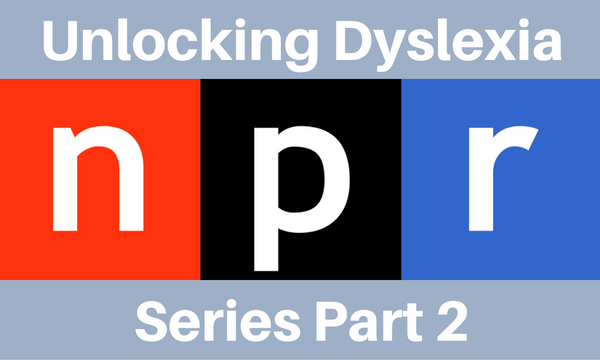Dyslexia Series on NPR News: Part 2
Written by Marie Lunney
Published on December 6, 2016
A new NPR radio series, “Unlocking Dyslexia”, sheds some light on the most common learning disability in America that is still a mystery to most. Gabrielle Emanuel, nprEd writer, and correspondent is dyslexic herself. In her series, she goes through explaining the difficulties of dyslexia, the science behind it, and the necessary steps to overcome it. This is part 2 of our 2 part review. Click here to read part 1.
The effects of dyslexia “extend[ ] far beyond the classroom, causing stress, tension, and confusion for families with a dyslexic child”. Emanuel receives some testimonials from parents of dyslexic children:
“There would be days that she could not get on the bus… Just the look of fear in her huge eyes – Mommy, I can’t do this; I can’t do this; don’t make me do this.” – Megan Lordos
“You could feel the cloud hover over the kitchen. It was just – it was a nightmare every night” – Lance Pressl
“He would get off the bus, and he would say to me, Mom, I’m stupid” – Geva Lester
 Many parents and their children find themselves in this emotional and destructive spiral without knowing what the problem is or how to fix it. One mother recounts the “‘school didn’t seem worried’…they kept telling her: ‘Well, let’s wait six more months, and we’ll see what happens”. This happens more often than not. “Schools are supposed to help children with dyslexia, but many don’t have the resources to do so.” As a result, dyslexia is often denied and intervention for it is delayed. “The research suggests early and intensive reading help is most effective”. Some intervention can be costly. As one family puts it “‘…we use their college fund to pay for it. We invest in the child that we have now. You know, college won’t be an option if they continue to hate school and reject everything that has to do with reading’” (Emanuel, “Raising A Child).
Many parents and their children find themselves in this emotional and destructive spiral without knowing what the problem is or how to fix it. One mother recounts the “‘school didn’t seem worried’…they kept telling her: ‘Well, let’s wait six more months, and we’ll see what happens”. This happens more often than not. “Schools are supposed to help children with dyslexia, but many don’t have the resources to do so.” As a result, dyslexia is often denied and intervention for it is delayed. “The research suggests early and intensive reading help is most effective”. Some intervention can be costly. As one family puts it “‘…we use their college fund to pay for it. We invest in the child that we have now. You know, college won’t be an option if they continue to hate school and reject everything that has to do with reading’” (Emanuel, “Raising A Child).
 The radio series highlights one dyslexia program, Lindamood-Bell, a NPR financial supporter. Emanuel received intervention at a Lindamood-Bell center as a child herself. However, she explains that “I’ve never been able to sound out unfamiliar words. And I still can’t” (“Millions Have Dyslexia”). Learning how to pronounce unfamiliar words should be a focus of treatment, a cornerstone of Lexercise therapy. Furthermore, Lindamood-Bell is very expensive, often only available in metro areas and disrupts a child’s schooling by requiring intensive, 4-6-hours-a-day instruction for 6 weeks.
The radio series highlights one dyslexia program, Lindamood-Bell, a NPR financial supporter. Emanuel received intervention at a Lindamood-Bell center as a child herself. However, she explains that “I’ve never been able to sound out unfamiliar words. And I still can’t” (“Millions Have Dyslexia”). Learning how to pronounce unfamiliar words should be a focus of treatment, a cornerstone of Lexercise therapy. Furthermore, Lindamood-Bell is very expensive, often only available in metro areas and disrupts a child’s schooling by requiring intensive, 4-6-hours-a-day instruction for 6 weeks.
If your experience sounds like the testimonials above, get your child immediate help. Lexercise Structured Literacy can be done in the comfort of your own home, works around your schedule, and most importantly guarantees a grade level increase in 8 weeks of therapy. Call us at 1-919-747-4557 with any questions or to get paired with your expert therapist.
Works Cited:
Emanuel, Gabrielle. “Raising A Child With Dyslexia: 3 Things Parents Can Do.” All Things Considered. NPR. 29 Nov. 2016. Radio.
Emanuel, Gabrielle. “Millions Have Dyslexia, Few Understand It.” All Things Considered. NPR. 28 Nov. 2016. Radio.
Photo Credit: NPR
Improve Your Child’s Reading
Learn more about Lexercise today.
Schedule a FREE
15-minute consultation


